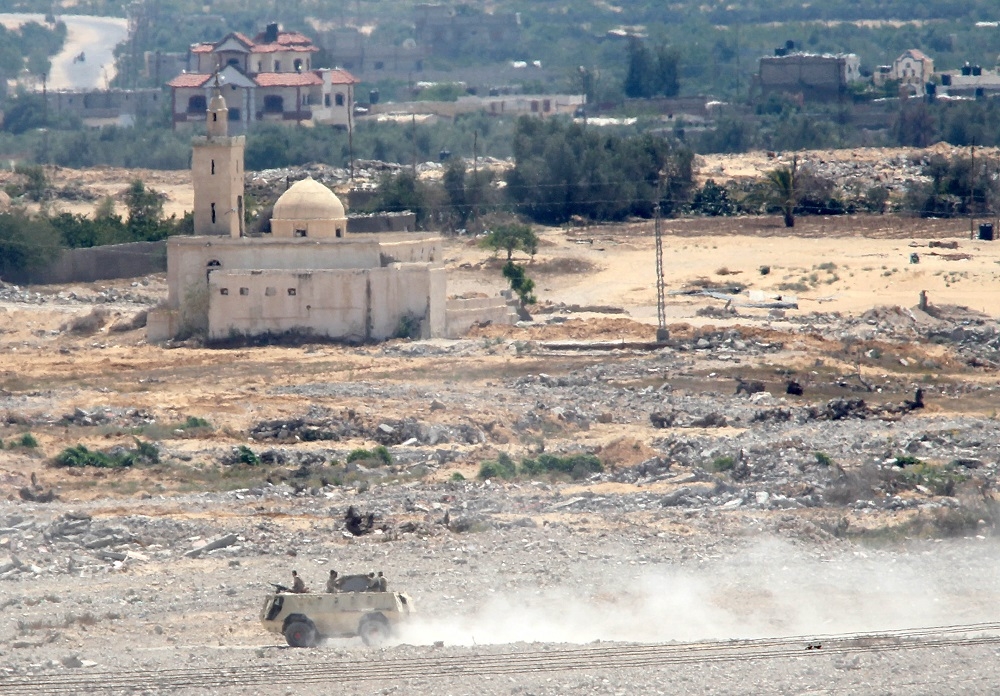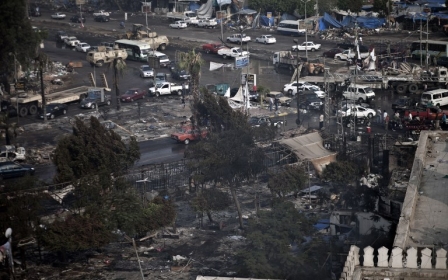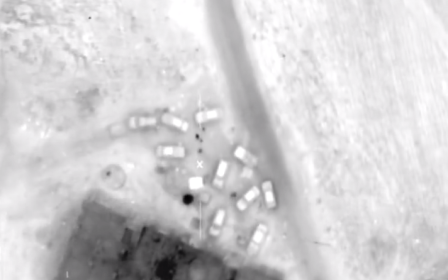The perils of daily life under military rule in North Sinai

CAIRO - “Imagine seeing dead bodies on the sides of the road on your way to work,” said Sarah, as she described her trip to university and back to her home in Arish in the northern Sinai Peninsula.
The road is now littered with fortifications, sand barriers and checkpoints that make the already long journey to the Suez Canal University affiliated campus even longer.
This has been the case for over two years, she says, adding that while the curfew from 5pm to 7am in place in October 2013 was worse, free movement remains paralysed. Since then the curfew has been reduced to begin at 12am and end at 6am, but Sarah maintains that people are still confined to their home towns.
Violence in Sinai has escalated since 31 soldiers were killed in attacks in October last year, with officials reporting regular clashes between militants and military personnel.
This weekend saw further clashes. On Saturday, seven soldiers were killed when a rocket attack struck a checkpoint in North Sinai, while 59 militants were are reportedly killed after a military-led operations in the restive Peninsula, a military spokesman said on Sunday.
North Sinai-based journalist Mohamed Seleem told Middle East Eye that since the security situation began to deteriorate, residents have been left facing multiple risks at the hands of the state, including shelling of homes, home demolitions, arbitrary arrests and enforced disappearances. Residents also struggle, he said, with long electricity cuts, curfews, interrupted internet access, and the cutting of telecommunication lines.
“The entire tragedy comes from places like the 101st brigades, where there is the worst kind of torture… and several [people] died and their bodies were thrown on the roads,” said Sarah, who refused to publish her real name for security reasons, in reference to a military headquarters in Arish.
“[The military] waits until they get into any confrontation with the Wilayat [the IS-affiliated Province of Sinai militant group] and then they get some people that were killed in prison and say ‘the terrorists have been killed’… and they post some photographs, and no one holds them accountable.”
This is one of the biggest dangers that the people of Sinai face, she explained. She says that when civilians are killed in Sinai, their deaths are celebrated as “victories over the terrorists”. On an almost weekly basis, the military posts statements on their official spokesperson’s Facebook page with headlines that read, “Army forces arrest and filter dangerous terrorist cells in Central Sinai”. Photographs of the dead also often follow with statements for additional effect.
In its latest statement, released on 12 July, the military said it has killed 252 “terrorist individuals” since 1 July.
But all this has come at a great price for the people of Sinai. When asked how often explosions hit peoples’ homes, Sarah responded: “Oh a lot… this is the norm now."
A few months ago, Sarah even heard gunshot coming from a nearby police station and recorded the gunfire from her balcony.
“One of our neighbours who lives closer to the station… he is a newly-wed; a bullet pierced through his house. He went to ask at the police station and they told him one of the police officers was going back home from the station late and, as he was arbitrarily shooting his gun, the bullet accidentally hit the house,” Sarah said.
When he tried to complain, the police simply brushed him off saying “oh well,” she added.
The relative impunity has meant that between 30 June until 10 July, at least 15 civilians have been killed and 25 more injured in North Sinai, according to Mustafa Singer, a journalist based in Shiekh Zuwaid.
According to Singer, the deteriorating situation has hit Shiekh Zuwaid, just east of the provincial capital Arish, particularly hard, with the town seeing the biggest exodus of citizens in North Sinai. Most of the displaced have gone to the towns of Arish and Beir Abd, where some have moved in with their relatives.
On 30 June the IS-affiliated Province of Sinai attacked 15 military checkpoints in Shiekh Zuwaid and killed at least 17 Egyptian conscripts, according to the military’s official accounts. Other reports claimed that up to 64 conscripts were killed.
Following the attacks, the military began excessive shelling campaigns against Rafah and Sheikh Zuwaid, as well as a series of arbitrary arrests and security raids of residents’ homes.
Artillery shelling destroyed Musa Abu Uweira’s home and killed his wife and their four children, who were between the ages of 10 and 14 years old, on 10 July.
“This [type of incident] has happened more than once,” Singer said. “Both [the military and the State of Sinai] are responsible for the blood shedding of civilians.”
The years of turmoil, however, mean that these cases are now viewed with a relative sense of “normality”.
In a 1 July statement, Human Rights Monitor identified the “chaos” in Sinai as “the worst and most violent in decades”. According to the human rights group, authorities have used the “war against terrorism” as a justification for various human rights abuses.
Things have been going from bad to worse. A “state of emergency” and a curfew have been imposed on North Sinai since last October, while military operations have been going on for more than eight months. “But there is no progress in the war on terrorism and increasing violations against civilians,” the report said.
Military operations have killed 1,500 civilians “outside the scope of the law” while 1,300 civilians have also disappeared. In addition, these military operations have destroyed over 1,000 homes and cars belonging to people who “are guilty of nothing other than living in places where the military has announced it is fighting terrorism,” the report added.
Between IS and the military
Civilians often get caught amid the clashes of the State of Sinai militants and the military. “They do not differentiate between us and terrorists,” Seleem said. “The military does not help the civilians that provide them with information on extremists.”
Ansar Beit al-Maqdes, which rebranded itself as the Province of Sinai, pledged allegiance to the Islamic State group in November 2014.
Since last August, the IS affiliate has claimed tens of decapitations of alleged military agents.
The group has beheaded people for cooperating with the military and according to Seleem “instilled fear in people that they may be at risk of beheading, in which case the military would be of no help”.
He added that in addition, the residents of Sinai are “marginalised in the media” which means that many other Egyptians are not fully aware of what is happening to their countrymen and women.
“I was shocked when Egyptian media spoke of the IS beheadings in Libya as though it was the first time Egyptians had been beheaded by IS,” one man who would not give his name due to security fears, told Seleem.
Militants had beheaded this man’s relative a few months ago after accusing him of cooperating with the military.
“The Wilayet [Province of Sinai] does not really have a lot of interactions in the street… I have not seen them,” Sarah told MEE, adding that they have less civilian victims than the military.
“They target only military buildings.”
Middle-aged North Sinai resident Abu Hussein on the other hand said that "interaction with militants" poses a big danger for the people of Sinai as "takfiri thought is filled with enmity towards civilians".
Displacement after clashes has also been added to the list of hardships that North Sinai residents face. Sinai-based journalists confirmed to MEE that tens of people have had to leave their homes during the last round of fighting which broke out on 30 June.
However, even travelling within the governorate comes with a burden. A few of the displaced have been arrested on charges of “disturbing the security of Shiekh Zuwaid,” Seleem said.
“People who have Shieikh Zuwaid or the border town of Rafah written on their national IDs face huge chances of arrest when moving through checkpoints,” Abu Hussein said.
“It is presumed that residents of these towns belong to militant groups… the risk is especially high if they happen to be wearing Bedouin clothes.”
A few months ago, Abu Hussein said that he was driving his truck toward Arish from Beir al-Abd. When his truck broke down, conscripts in a military camp approximately 300 meters away were unsure what to do and began firing at him.
"A few other conscripts that had been driving behind me saw that the car had only broken down, and they pointed towards the sniper to stop firing," Abu Hussein told MEE as he explained how arbitrary gunfire is a common danger Sinai civilians face.
There is a persistent fear of the allegations that North Sinai residents are traitors, that they kill soldiers, and do not help the military, he added.
In October, militants killed at least 33 soldiers at the Qaram al-Qawadis checkpoint in North Sinai, which marks an intersection between Rafah, Al-Awja, Arish, and Al-Kharuba.
After this incident, the Egyptian army moved towards creating a “buffer zone” on the Gaza-Egypt border in effort to “fight terrorism”. The military demolished at least 800 homes in the process.
“My friend’s house was destroyed,” Sarah said. “Honestly, some families were compensated. But the compensation was nothing compared to the prices of their old homes, and the money they had to pay to move into a new home.”
According to Seleem, some families have had to move into huts due to their dire economic conditions.
"But people are still coping, somehow," Sarah said. "Well, there is nothing [else] that we can do."
New MEE newsletter: Jerusalem Dispatch
Sign up to get the latest insights and analysis on Israel-Palestine, alongside Turkey Unpacked and other MEE newsletters
Middle East Eye delivers independent and unrivalled coverage and analysis of the Middle East, North Africa and beyond. To learn more about republishing this content and the associated fees, please fill out this form. More about MEE can be found here.




